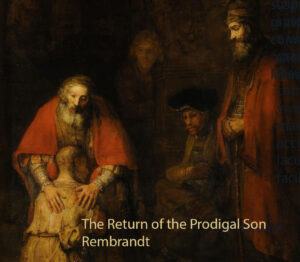“Jesus said to his disciples: ‘Do not think that I have come to abolish the law or the prophets.
I have come not to abolish but to fulfill. . . .
‘You have heard that it was said to your ancestors,
You shall not kill. But I say to you, whoever is angry with his brother will be liable to judgment;
and whoever says to his brother, ‘ imbecile,’ will be answerable to the Sanhedrin;
and whoever says, ‘You fool,’ will be liable to fiery Gehenna.
‘You have heard that it was said, You shall not commit adultery. But I say to you, everyone who looks at a woman with lust has already committed adultery with her in his heart. . . .
‘You have heard that it was said, Whoever divorces his wife must give her a bill of divorce.
But I say to you, whoever divorces his wife – unless the marriage is unlawful – causes her to commit adultery, and whoever marries a divorced woman commits adultery.
‘Again you have heard that it was said to your ancestors, Do not take a false oath, but make good to the Lord all that you vow. But I say to you, do not swear at all. . . . Let your ‘Yes’ mean ‘Yes,’ and your ‘No’ mean ‘No.'” Mt 5:17-37
What Jesus presents here is a series of contrast statements through which he reveals to us disciples that religious commandments are meant to be signs revealing the inner reality of what is in our hearts: the love of God and our fellow man from which our actions arise. And when we catch ourselves being angry, wanting to commit adultery or to ask for a divorce, or saying one thing when deep inside we know we are thinking something else: do we realize that these are times of grace – of graces that can lead us to shed our bad habits? . . . times when God wants to help us become more like Jesus? . . . times of graces offered to us but which we too often refuse?
In these days before we begin the Lenten season of 2023, let us be attentive to our thoughts, words and actions and accept the graces the Spirit of God is offering us. What is the deeper intentionality from which our thoughts, words and actions stem? Is it an intentionality that mirrors that of Jesus whose disciples we profess to be? Is it coming forth from the image of God breathed into us when we were conceived or is it from a self-centeredness that we have developed by repeatedly choosing the non-Christlike options, our own self-centered wants, instead of wanting only to be true to Christ who said, “Take this – this that is my Body which is given for you.” And “Do this in memory of me.”
So, in these days before Ash Wednesday (February 22), let’s examine our everyday thoughts, words and actions as they arise each day. If I feel anger toward someone or something, if I feel like saying something uncomplimentary about someone or about a particular situation, instead of blaming the situation or the other person for my reaction, let me ask Jesus to look with me at the deeper interiority that is causing me to feel or act this way. For instance, when I catch myself becoming angry, is it that I am angry because this person is “different”? Do I say I favor diversity but really want things to be according to my way? (That’s saying “yes” when I mean “no.”) Is it that I don’t like this person whom Jesus is probably sending me to show them the love God has for them? Let’s make a mental note of these un-disciple-like interiorities. And, instead of giving up chocolate for Lent, let these un-disciple-like interiorities be what we “give up” for the rest of our lives.
Lent 2023 is quickly approaching. Let us live these pre-Lenten days with a willingness to be honest. Let’s accept the graces that will help us remove from our hearts whatever is putting a barrier between us and God and others. And let’s do this, not just as individual disciples, but as the St. Michael’s community of disciples. What an impact that could have for the people and the places where we live and work and play.
Sister Loretta




